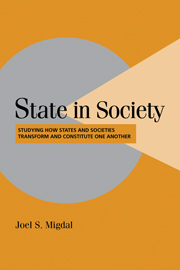Book contents
- Frontmatter
- Contents
- Acknowledgments
- Part I Introduction
- Part II Rethinking Social and Political Change
- Part III A Process-Oriented Approach: Constituting States and Societies
- Part IV Linking Micro- and Macro-Level Change
- 6 INDIVIDUAL CHANGE IN THE MIDST OF SOCIAL AND POLITICAL CHANGE
- Part V Studying the State
- Bibliography
- Index
- Titles in the series
6 - INDIVIDUAL CHANGE IN THE MIDST OF SOCIAL AND POLITICAL CHANGE
Published online by Cambridge University Press: 05 September 2012
- Frontmatter
- Contents
- Acknowledgments
- Part I Introduction
- Part II Rethinking Social and Political Change
- Part III A Process-Oriented Approach: Constituting States and Societies
- Part IV Linking Micro- and Macro-Level Change
- 6 INDIVIDUAL CHANGE IN THE MIDST OF SOCIAL AND POLITICAL CHANGE
- Part V Studying the State
- Bibliography
- Index
- Titles in the series
Summary
Scholarly writing about rapid political and social changes, especially in the Third World, has had a Janus-faced quality. Some scholars focused on macro-level topics, dealing with changes at the structural or organizational level. Much of the research labeled political development, social and political modernization, economic development, and dependency was pitched at this level. Others concentrated on the individual as the key to the direction and content of rapid societal change. Rarely did a single work seriously attempt to join the two levels of analysis.
Frequently authors writing on one level would do little more than acknowledge the problems and complexities on the other. More often than not, scholars dealing with macro-level topics shrouded the subject of individual change in implicit assumptions instead of explicit assertions. Or, at times, they put forth ideas of individual change based on purely mechanistic notions of individuals as rational actors, who engage in simple costbenefit calculations. Those focusing on the level of the individual likewise made simple assumptions about complex macro-level political and social changes.
Every theory of social and political change must have a corresponding model of individual change: There is no social change without individual change and vice versa. The gap between the two levels of analysis has led to some curious developments. Whereas the literature on macro-level change written in the several decades after World War II has come under severe attack leading to new approaches to the subject, the literature on individual change in the throes of rapid social and political transformation has suffered much less from such a relentless and widespread assault.
- Type
- Chapter
- Information
- State in SocietyStudying How States and Societies Transform and Constitute One Another, pp. 173 - 192Publisher: Cambridge University PressPrint publication year: 2001



